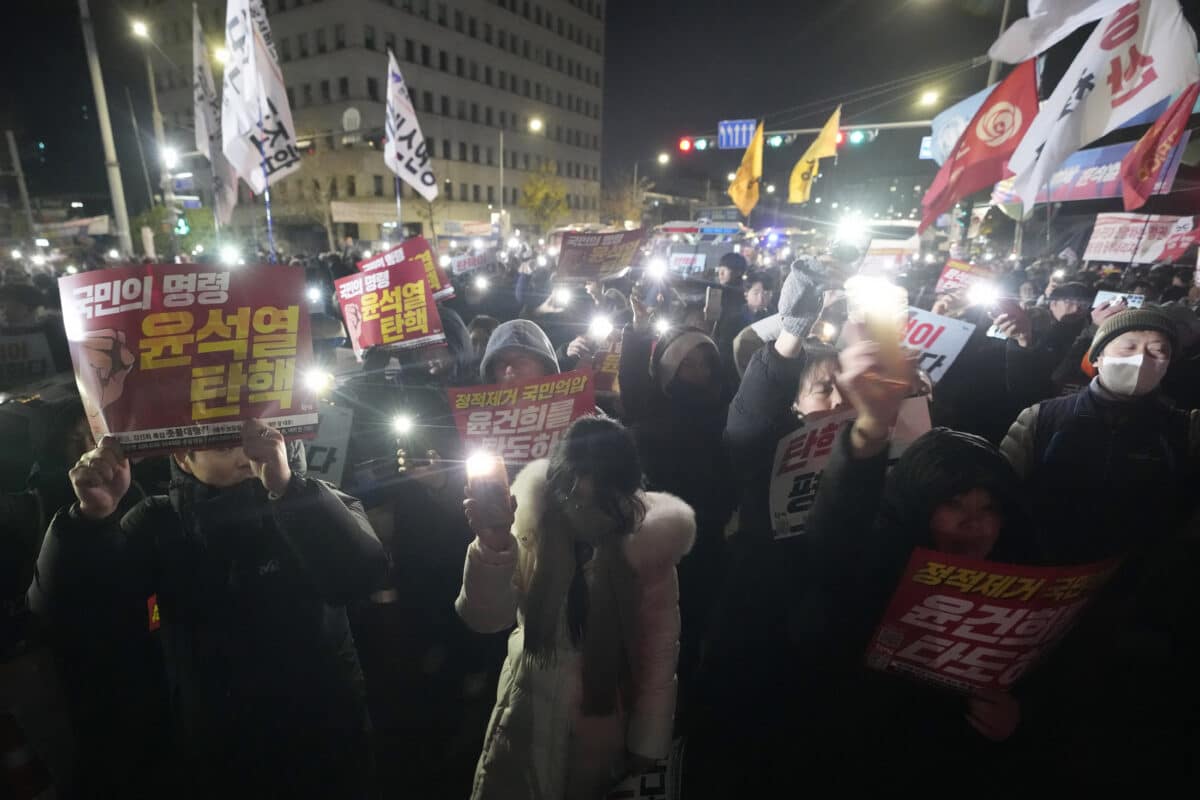What we know about South Korea’s martial law

People gather to demand South Korean President Yoon Suk Yeol to step down in front of the National Assembly in Seoul, South Korea, Wednesday, Dec. 4, 2024. Associated Press
SEOUL — South Korea’s President Yoon Suk Yeol on Tuesday said he would lift martial law just hours after he imposed it, in a brief and confusing episode in which he blasted the opposition as “anti-state forces” threatening the country’s democracy.
The unexpected move from Yoon — the first time martial law has been declared in South Korea in more than four decades — alarmed the United States and the country’s other allies.
READ: South Korea lifts martial law decree after lawmakers vote against it
What do we know about the imposition, its lifting and what might come next?
What was the declaration?
In a dramatic, late-night emergency television address to the nation, Yoon announced that he was imposing martial law in South Korea, as he accused the opposition of paralysing the government with “anti-state activities”.
A six-point decree from the new martial law commander, army chief General Park An-su swiftly followed, banning political activities and parties, “false propaganda”, strikes and “gatherings that incite social unrest”.
The order also brought all media outlets under the authority of martial law and directed all medical staff, including striking doctors, to return to work within 48 hours.
What happened at parliament?
Security forces sealed the National Assembly, helicopters landed on the roof and troops entered the building for a short time, seemingly in a bid to prevent lawmakers from getting inside.
READ: South Korean parliament defies president, lifts martial law declaration
But 190 lawmakers managed to enter and voted unanimously to reject Yoon’s declaration and call for martial law to be lifted.
Outside, hundreds of protesters gathered, many raising chants calling for Yoon to be arrested.
What happened next?
Following the lawmakers’ vote, Yoon backed down. His cabinet additionally approved the motion to lift the order, Yonhap news agency reported.
“Just a moment ago, there was a demand from the National Assembly to lift the state of emergency, and we have withdrawn the military that was deployed for martial law operations,” Yoon said in a televised address around 4:30 am (1930 GMT Tuesday).
Under South Korea’s constitution, the parliamentary vote to lift martial law has to be respected.
Why did Yoon do this?
Yoon said he was acting to safeguard his country’s liberal democracy from “anti-state elements” and “threats posed by North Korea” — but gave little detail.
While unexpected, the announcement came in the context of a festering budget row between Yoon and the opposition Democratic Party.
The opposition has slashed around 4.1 trillion won ($2.8 billion) from Yoon’s proposed 677 trillion won budget for next year, prompting the president to complain that “all key budgets essential to the nation’s core functions” were being cut.
“What is clear is that Yoon has been a deeply unpopular, ineffectual leader and he is having a hard time getting any kind of public support for anything he’s trying to do,” said Alan Yu, a former US diplomat in Asia now at the Center for American Progress.
“The use of martial law feels almost like a desperation move to try to break out, both in a political and policy sense, but it is really poorly played on both fronts.”
What is next for Yoon?
Domestically, pressure has only grown further on Yoon after his late-night bombshell.
South Korea’s main opposition party has demanded that Yoon step down, accusing him of “insurrection”.
The country’s main labor union group has also called an “indefinite general strike” until he resigns over the “irrational and anti-democratic measure”.
Yoon’s own People Power Party described his attempt at imposing martial law as “tragic” and demanded that those involved be held accountable.
What has the reaction been abroad?
South Korea is a key Western ally in Asia, seen as an important democratic bulwark in a region dominated by authoritarian regimes, and the drama is being watched with concern.
READ: US ‘relieved’ S. Korea president reversed course on martial law
Washington said it was “relieved President Yoon has reversed course” on his martial law order.
Earlier, Britain and Germany both said they were closely following developments.
China, a key ally of nuclear-armed North Korea, urged its citizens to exercise caution, while Russia — itself increasingly close to Pyongyang — called the situation “alarming”.
First posted 6:28 am
